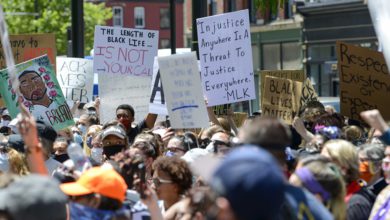
WASHINGTON – The House voted Tuesday to hold former White House chief of staff Mark Meadows in contempt for defying a subpoena from the committee investigating the Jan. 6 Capitol insurrection.
The House voted 222-208 on the measure, which also urged the Justice Department to prosecute Meadows criminally for contempt. He would become the second aide to former President Donald Trump facing charges, after political strategist Steve Bannon.
Rep. Bennie Thompson, the chairman of the investigating committee, said Meadows was hiding behind a claim of executive privilege, to keep communications with Trump confidential, in an apparent attempt at a coverup. Thompson said Meadows has no privilege because President Joe Biden waived it and because Meadows already provided 9,000 documents to the panel.
“If you’re making excuses to avoid cooperating with our investigation, you’re making excuses to hide the truth from the American people about what happened on Jan. 6,” said Thompson, D-Mississippi. “You’re making excuses as part of a coverup. If you base your arguments on these excuses, if you adopt these excuses as your own about why you won’t take action, then you’re part of that coverup, too.”
The top Republican on the panel, Rep. Liz Cheney of Wyoming, said Trump is hiding behind executive privilege and fellow Republicans knew they were "defending the indefensible."
“Whether we tell the truth, get to the truth and defend ourselves against it ever happening again is the moral test of our time," Cheney said. "How we address Jan. 6 is the moral test of our generation.”
But other Republicans argued that Democrats were running a partisan investigation. Rep. Jim Banks, R-Indiana, said the committee pursued criminal contempt against three officials while trampling on people’s rights by seizing call and text records from people who were at the Capitol on Jan. 6.
“This is what you get when Democrats get free rein,” Banks said. “Secret snooping. Harassment. Contempt for the rules of Congress. Criminalization of dissent. And it all ends with their opponents in jail.”

George Terwilliger, a lawyer for Meadows, said in a statement Tuesday the former chief of staff never stopped cooperating with the committee. Terwilliger argued that Meadows cannot be compelled to appear for questioning because of Trump’s claim of executive privilege.
“Mr. Meadows never ‘stopped cooperating’ as is widely reported,” Terwilliger said. “Rather, he has maintained consistently that as a former Chief of Staff he cannot be compelled to appear for questioning and that he, as a witness, is not licensed to waive Executive Privilege claimed by the former president.”
Terwilliger accused lawmakers of duplicity for accusing Meadows of contempt after receiving thousands of documents.
“What message does that duplicity send to him as well as to others who might be inclined to consider cooperating in good faith to the extent possible?” Terwilliger asked.
The House panel investigating the Capitol insurrection Jan. 6 also recommended a contempt citation and criminal charges for former Justice Department official Jeffrey Clark, who was at the center of efforts to urge Georgia officials to delay their certification of election results.
But a full House vote was postponed for Clark until after he meets with the committee again Thursday. Clark’s lawyer said he will refuse to answer questions under his Fifth Amendment right against self-incrimination.
Meadows, who provided 9,000 documents before refusing to testify, said he was following Trump’s assertion of executive privilege, to keep their communications confidential.
But lawmakers said he couldn’t assert executive privilege for documents he’d already provided the committee. Legal experts also said executive privilege would only protect communications dealing with issues such as national security, but not hiding a criminal conspiracy such as the Watergate investigation of nearly 50 years ago.
A court could have to decide where Trump's challenges stand. A U.S. District Court and D.C. Circuit Court of Appeals panel have each ruled that President Joe Biden's waiver of executive privilege for the investigation outweighs Trump's claim. But Trump is expected to appeal to the Supreme Court.
Cheney read texts Meadows provided that revealed Republican lawmakers, Fox News hosts and administration officials sent him urging Trump to call off the mob.
“The texts sent to Mark Meadows that were released by the select committee last night were nothing short of a bombshell,” said Rep. Jim McGovern, D-Mass., chairman of the Rules Committee.
Cheney read more texts Tuesday at the Rules Committee about the panic at the Capitol during the 187 minutes when Trump took no apparent action to stop it.
“Here are a few others from Republican members," Cheney said. "‘It is really bad up here on the Hill.’ Another one: ‘The president needs to stop this ASAP.’ Another one: ‘Fix this now.’ As we saw last night, dozens of texts including from Trump administration officials, from members of the press, from Donald Trump Jr. urged immediate action by the president. But we know hours passed with no action by the president to defend the Congress of the United States from an assault while we were trying to count electoral votes.”

Leaders in the White House and Senate said Tuesday they were monitoring the investigation and the revelations about the emails.
“Well, it’s disappointing and unfortunately not surprising that some of the very same individuals who were willing to warn, condemn and express horror over what was happened on Jan. 6 in private were totally silent in public or, even worse, were spreading lies and conspiracy theories and continue to since that time,” White House press secretary Jen Psaki said.
Senate Minority Leader Mitch McConnell, R-Kentucky, said he wasn’t in contact with Meadows on Jan. 6, but he is following the House probe.
“It will be interesting to reveal all the participants who were involved,” McConnell said.
More:Who has been subpoenaed so far by the Jan. 6 committee?
At the Rules Committee, Rep. Michael Burgess, R-Texas, said protests are routine at the Capitol and he cited opposition to the Affordable Care Act for comparison.
“We’ve had bad protests here at the Capitol before," Burgess said. “It’s what we do here."
Thompson said protests against the Affordable Care Act were nothing like the violence Jan. 6, when the mob hurt people and broke doors and windows while ransacking the building.
Cheney also disputed Burgess about the riot being routine. She said lawmakers must protect government operations.
“No, it isn’t what we do here,” Cheney said of the riot. “Jan. 6 is not what we do here and it can never be what we do here.”
The committee is investigating what led to the Jan. 6 attack on the Capitol and how the White House and Trump responded. About 140 police officers were injured and the counting of Electoral College votes halted temporarily before certifying Biden’s victory over Trump.
About 300 witnesses have cooperated with the committee and provided 30,000 records. The committee plans weeks of hearings next year.
Source link









